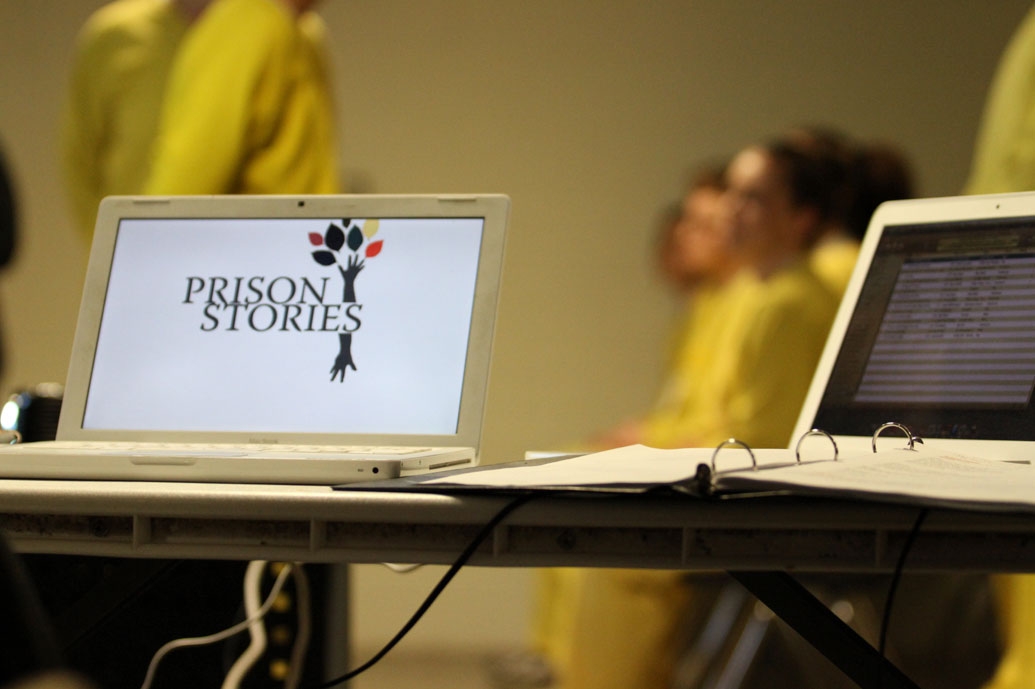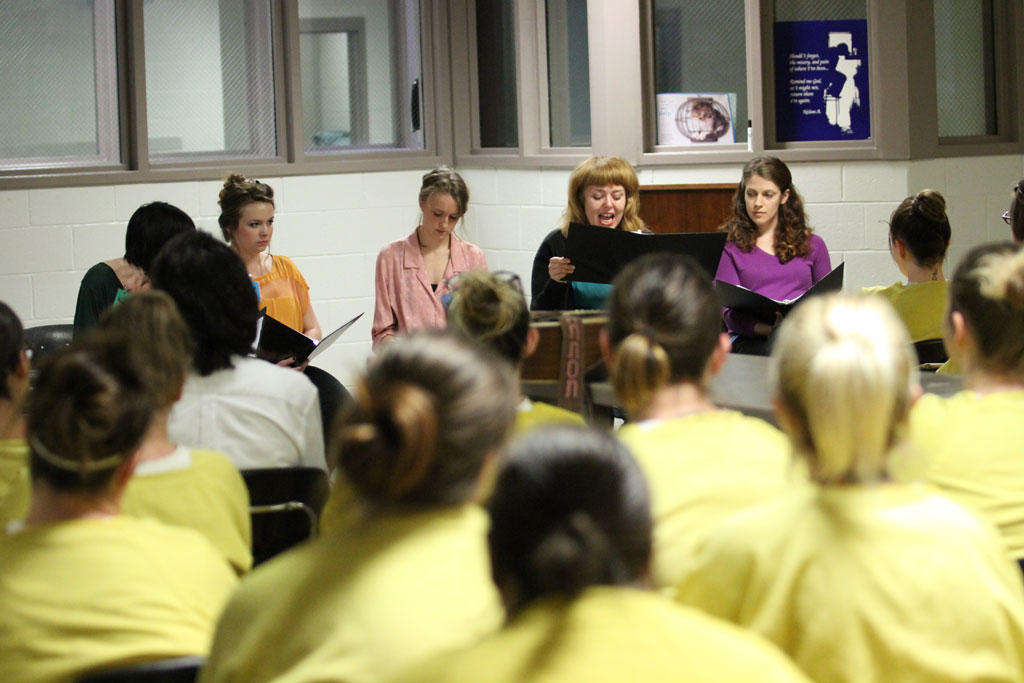“Whenever we sit face-to-face and share our stories, we become more human,” says Elaine Blanchard, facilitator and founder of the Prison Stories Project in Memphis. The project is deceptively simple. For four months, 12 prison inmates participate in a class designed to help them tell their stories. At the end of that time, their work is shaped into a script to be performed by stage actors. But the result is something tremendous.
Kathy McGregor, a local storyteller, worked with Blanchard in Memphis and has helmed the expansion of Prison Stories, testing it out here in Fayetteville. I recently sat down with McGregor, the project’s coordinator, and area actor Erika Wilhite, who serves as artistic director of the project. I didn’t need to ask many questions; they both were brimming with their own stories about the summer-long experience they shared with a small group of incarcerated women.
On Thursday, Oct. 4, St. Paul’s Episcopal Church will host the fruits of those meetings in a performance of the inmates’ collective stories, something Wilhite calls “a collage of the women’s writings.” The event will provide Northwest Arkansas with an opportunity to meet members of its community that don’t often see the spotlight.
Earlier that day, the company will first perform the show for fellow inmates of the NWA Community Corrections Center, located about a block from Dickson Street on College Avenue. There, five actresses will interpret stories originally composed on yellow legal pads that happened to match the uniform jumpers each prisoner must wear.
Wilhite and McGregor said they are both excited to see what their students’ reactions will be to this portrayal of their own stories, though some may be tough to hear. One young woman was literally traded to a meth dealer for drugs; another waits to get out only to return to her abusive family because she has nowhere else to go. All but one of the women in the group are mothers. Probably none of them thought this would be their story.
The performance is built from songs, poems and art. And, the project is truly homegrown. Fayetteville singer/songwriter Shannon Wurst helped inspire lyrics and music. In one session, women told their stories holding masks that local art therapist JoAnn Kaminsky helped them craft. Most regularly, poet Katie Nichol guided the inmates through writing workshops which resulted in the chronicling of experiences some inmates confessed they’ve never talked about before.
The participants also read assigned texts and studied film as part of their journey. “They would read fifty pages of ‘Their Eyes Were Watching God’ and then we would bring that back to the group to discuss it,” McGregor explained. “Elaine (Blanchard) had a vision that the women she was working with were a lot like Janie, the lead character in ‘Their Eyes Were Watching God.’ They had dreams and visions, but they were locked out somehow because of where they came from.” The inmates also watched Carolyn Briggs’ movie Higher Ground, the story of a woman struggling with her own spiritual journey. At its core, the project seems to ask, ‘If you could tell your story, could telling it save you?’ Perhaps there is no question more central than that. “The end result” once the workshop ended, Wilhite said was in “understanding the power of story.”
The story of where these women came from has become their hope for a better future. They constructed ‘life maps,’ that note landmark life events from their earliest memories to the present. The workshop’s leaders said those maps were the real turning point. “They saw themselves [before the workshop] as outside of the arts,” McGregor said. But now she thinks that’s changed. She hopes that the realization might improve their chances once their time is up: “I’d like to think that if we’re given an opportunity to tell our stories, and give voice to the voiceless – to people who don’t normally have access – if they can listen to their stories, hear their stories told, and tell their stories, that it will empower them in a way that will reduce recidivism. That could be the end result of that, right?”
Once they get out, many of these women will return to their lives as they were. Currently, the state of Arkansas does not have so much as a halfway house for those who have served their time. “I’d still like to track whether this program made a difference,” McGregor said. Wilhite and McGregor have set up a post office box address and provided each participant with two self-addressed, stamped envelopes. One of those is reserved for sharing what their impressions are after they see the performance on Thursday. The other they’ve been asked to hold onto, to write to them once they get out.
There is also a website in the works for the women to contribute to, so they can post whatever they continue to write. Wilhite and McGregor hope the website will help them to stay in touch. But mainly, it will be for the women to share with each other what it’s like on the outside. The story may end, but the bridge they’ve built is still there.
McGregor said she has a feeling about whether what she’s done was helpful. “These are not ‘bad’ women; they’ve committed non-violent crimes,” she said. “The life maps show that. Maybe it’s only by the luck of the draw that some of us don’t end up in prison.” She said those who escape incarceration can develop an attitude that such people – those who know the system from the inside-out – are truly other. “Let’s look at the story of the Other,” McGregor suggests. “Because only until we can invite the Other in do we end all of this divisiveness. And only then can healing happen. They are as much a part of the community as I am.”
McGregor hopes that this project can be a bridge between the women who have been a part of the correctional system and those who tend to see them as strictly defined by the crimes they were accused of.
Thursday night’s showcase might be bittersweet, but it won’t be the end. Wilhite called the program one of the best things she’s been a part of. “As far as meaningful, as far as in the grand scheme of things, what really matters,” she said.
McGregor said she’s sad its over, but knows that in so many ways the work will continue.
At the last workshop they gave each woman a gift, a book. “One woman,” McGregor said, “she started crying and she said, ‘I’m 26 years old and this is the first book anyone has ever given me.'”
Thursday’s public performance will begin with a reception including snacks, drinks and a display of the participants’ life maps and their testimonials. A nursery facility will be provided. A Q&A session will follow the staged reading.
NWA Prison Stories Project – public performance
Date: Thursday, Oct. 4, 2012
Time: Reception at 6:30 p.m., Performance at 7:30 p.m.
Location: St. Paul’s Episcopal Church, 224 N East Ave., Fayetteville
Cost: $10 suggested donation to help counter the cost of the project
Interview clips: [audio:http://wonderstatemedia.com/assets/flyer/mp3/prisonstoryproject-interview.mp3]




